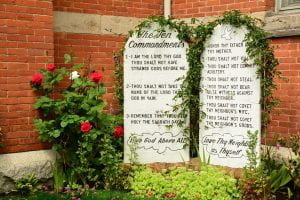Beliefs doesn’t only show the problem of witchcraft in the play but also are an important theme in the time period and in the city of Salem. As beliefs can represent a person’s value, people that value their reputation a lot will try to use the belief as a tool to make themselves look more noble and righteous.
In The Crucible by Arthur Miller, John Proctor is a hypocrite because he uses the belief that is popular to make his reputation look good. And to preserve and protect his reputation, he presented himself in the guise of others and often made basic violations in life. As Reverend Hale interviewed Proctor at late evening, to present his thought about religion, Proctor showed trouble in answering the basic 10 commandments. Moreover, describes this most important part of religion to be a small fault.
PROCTOR, counting on his fingers: Thou shalt not steal. Thou shalt not covet thy neighbor’s goods … With some hesitation: Thou shalt remember the Sabbath Day and keep it holy. He is stuck. He counts back on his fingers, knowing one is missing. Thou shalt not make unto thee any graven image.
HALE: You have said that twice, sir.
PROCTOR, lost: Aye. He is failing for it. (Miller, 63).
 Image by Jondolar Schnurr from Pixabay
Image by Jondolar Schnurr from Pixabay
After deep considerations about what is being violated, I agree with Proctor, what he said. As for what he did, is obviously wrong.
PROCTOR, as though a secret arrow had pained his heart: Aye. Trying to grin it away—to Hale: You see, sir, between the two of us we do know them all. Hale only looks at proctor, deep in his attempt to define this man. Proctor grows more uneasy. I think it be a small fault. (Miller, 64).
I do not agree with what Proctor did here, in other words, he has great reputation, only because he is known religious, which is a betrayal of his person. However, compared to other hypocritical characters such as Reverend Hale, the spiritual leader of the community, he violates the commandments by his greedy and selfish trait. Compared to what Proctor said, “it be a small fault” is what I agree on. If religion is so important and righteous, these conflicts and arguments wouldn’t occur. It is because these people are too dependent on religion so that all actions will be connected with religion and conflicts would occur. I suppose these characters will get better along without religious belief, and if not, referring back to what Proctor mentioned, don’t depend too much on it.
Works Cited:
Miller, Arthur. “The Crucible.” New York, Penguin Classics, 2003.